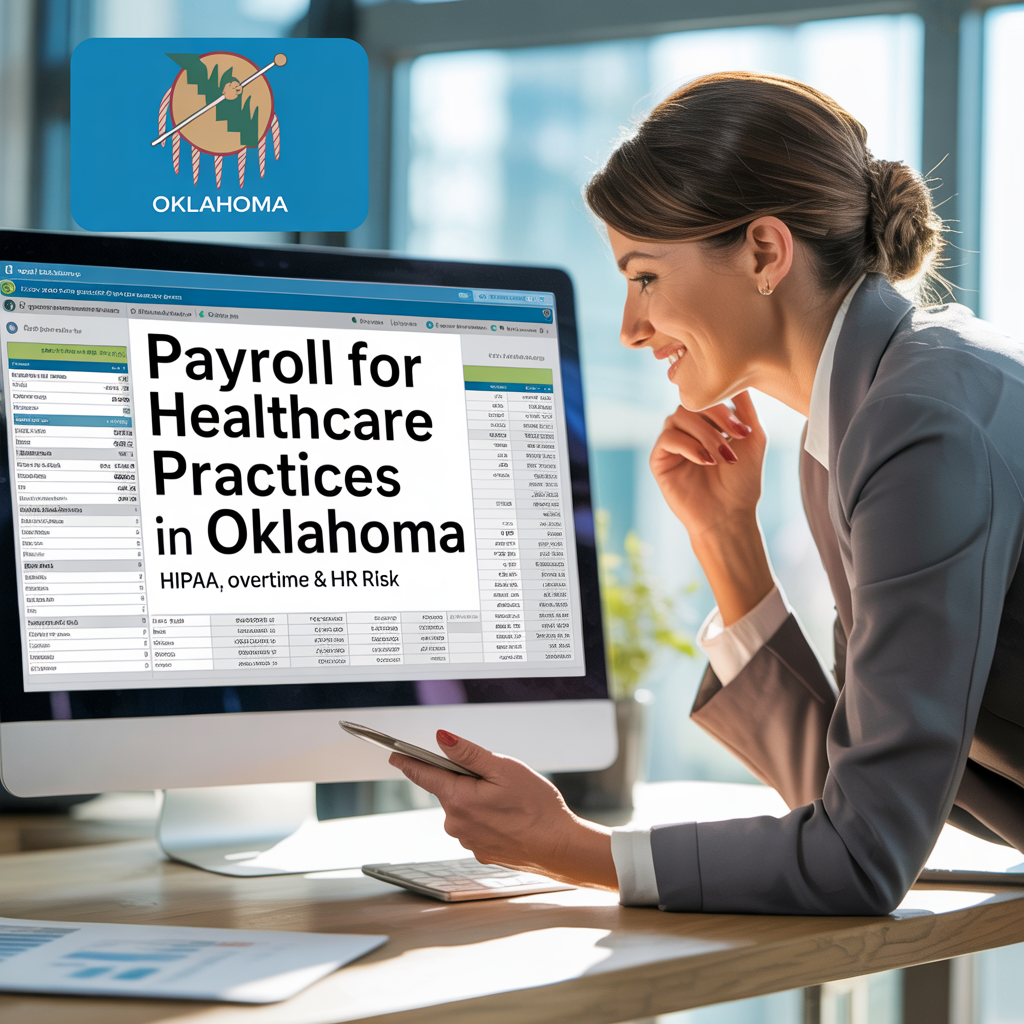Payroll for Healthcare Practices in Oklahoma – HIPAA, Overtime & HR Risk

Healthcare practices in Oklahoma face payroll challenges that most other businesses never have to consider. Whether you run a dental office, primary care clinic, physical therapy group, or counseling practice, you’re juggling compliance, privacy, overtime rules, and high staff turnover — all while trying to deliver patient care.
In this post, we’ll break down the specific payroll challenges facing Oklahoma medical and healthcare providers, and how CPA-led payroll support can help you avoid costly errors and HR risk.
✅ 1. Payroll and HIPAA: What Healthcare Employers Need to Know
Let’s be clear: HIPAA does not directly regulate payroll, but it does affect how you store and handle sensitive employee information — especially if payroll systems interface with electronic health records (EHRs) or benefit platforms.
Key risks:
- Storing payroll data on the same server as patient data (non-compliant)
- Using employee email addresses tied to PHI
- Handling benefit enrollments that include medical records
- Using payroll systems that lack audit trails or secure logins
If you're processing payroll internally or through a non-specialized vendor, you're opening the door to data risk that can violate HIPAA safeguards — and damage trust among staff.
✅ 2. Overtime Rules for Medical Staff: Oklahoma’s Most Misunderstood Area
The Fair Labor Standards Act (FLSA) governs how and when employees must be paid overtime. Healthcare presents unique classification challenges:
Misclassification issues:
- RNs vs. LPNs vs. MAs: Some are exempt; some are not.
- Admin staff vs. clinical staff: Many front desk workers must be non-exempt.
- “On-call” pay and shift differentials: Often underpaid or misclassified.
- Overtime averaging: Not allowed under FLSA, even for healthcare.
Mistakes in classification and compensation can trigger DOL audits, wage claims, and back pay orders — especially in high-turnover clinics or multi-location practices.
Learn more about payroll compliance for Oklahoma businesses »
✅ 3. Turnover Creates Payroll Risk — and Payroll Can Help Fix It
Healthcare has one of the highest turnover rates of any industry in Oklahoma. When employees leave, incomplete or delayed final paychecks can:
- Trigger wage complaints
- Cause compliance issues with final PTO payout
- Create morale problems for your remaining team
CPA-led payroll ensures:
- Accurate and timely final pay
- Proper calculation of unused PTO
- Documentation for disputes and audits
- Employee self-service access for W-2s and prior pay stubs
This builds trust — and helps reduce ongoing turnover.
✅ 4. Multi-State Payroll for Traveling Nurses, Therapists & Telehealth Teams
If your practice uses traveling nurses, contract therapists, or offers telehealth services across state lines, you must:
- Register in those states for payroll taxes
- Track work location and hours by state
- Issue W-2s with correct jurisdictional breakdown
Oklahoma-based providers often expand into Texas, Kansas, Arkansas, or even nationwide with remote staff — but fail to update their payroll systems, leading to incorrect tax filings and potential penalties.
We manage multi-state payroll compliance as part of our full-service CPA payroll packages.
✅ 5. Integration With Scheduling, PTO & HR Systems Is Essential
Healthcare payroll is not just about cutting checks — it's about syncing:
- Staff schedules
- On-call shifts
- Paid and unpaid time off
- Credentialing and employee onboarding
- Benefits eligibility
We use iSolved HCM, a full human capital management platform that integrates payroll with:
- Time tracking
- PTO policies
- Benefits administration
- HR workflows and compliance documentation
See how iSolved works for Oklahoma healthcare practices »
✅ 6. Payroll and Credentialing Data Must Be Synced
Did you know? Payroll reports are often used to:
- Verify hours worked for CE compliance
- Audit FTE status for benefits eligibility
- Satisfy credentialing organizations (Medicare, Medicaid, Aetna, BCBS, etc.)
Incorrect records or classification can delay credentialing or insurance billing — costing you time and money.
Our CPA team ensures payroll data aligns with credentialing and tax compliance needs.
💬 FAQs – Healthcare Payroll in Oklahoma
Q: Does HIPAA apply directly to payroll?
Not usually — but if you store or transmit payroll data alongside PHI or use the same systems, you could create security risks.
Q: Are nurses exempt from overtime?
Some are — but only if they meet specific FLSA duties tests and are paid on a salary basis. Many front-line nurses must be non-exempt.
Q: Can we average hours worked over two weeks to avoid overtime?
No. The FLSA requires that overtime be calculated weekly, even for healthcare.
Q: We operate in multiple states. Do we need to register for payroll taxes everywhere?
Yes. Even if the employee only works remotely for a few hours, state registration and tax withholding may be required.
Q: Can we handle payroll in-house for a small practice?
Yes, but it’s risky. CPA-led payroll ensures compliance with IRS, OTC, DOL, and credentialing requirements — and prevents internal errors that could trigger complaints.
✅ We Help Oklahoma Healthcare Providers Run Compliant, CPA-Led Payroll
At Boulanger CPA, we serve medical, dental, therapy, and wellness providers across Oklahoma. Our payroll systems are designed for:
- HIPAA-adjacent privacy
- Overtime compliance
- PTO and scheduling integration
- Multi-state team management
- Healthcare-specific reporting
Schedule Your Free Payroll Consultation
View Our Transparent Per-Employee Pricing

Marc Boulanger
Marc views his accounting business as an extension of his family. And while he holds a Bachelor of Arts in Business Administration and Accounting and a Masters of Science in Accounting, he values traveling around the country with his wife of 30 years and 5 kids, Marc learned that communication is the key to effective team work.


